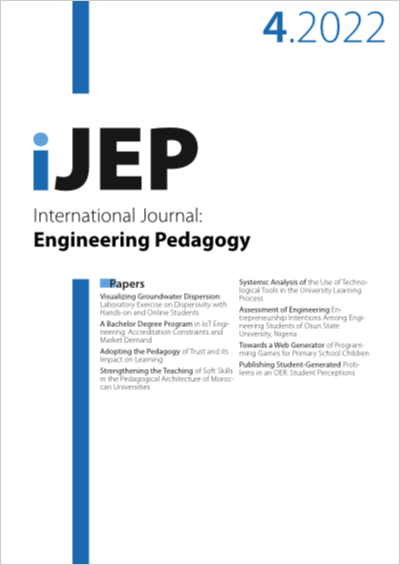Assessment of Engineering Entrepreneurship Intentions Among Engineering Students of Osun State University, Nigeria
DOI:
https://doi.org/10.3991/ijep.v12i4.30111Keywords:
unemployment, engineering, entrepreneurial intention, planned behavioural theoryAbstract
Entrepreneurship is the major solution to the unemployment problem that has resulted to multifaceted socio-economic challenges in the developing worlds. If engineer becomes entrepreneur, this will not only create jobs but promote technological development and a sustainable national economic growth is guaranteed. The process of entrepreneurship starts from the development of intention to embark on such a venture, hence this study assessed the entrepreneurial intentions of the engineering students in the universities. To accomplish this task, Ajzen theory of planned behaviour is applied. A survey was conductor at the faculty of engineering, Osun State University, Osogbo, Nigeria through a structured questionnaire administered to 470 engineering students in 2021. The data collected was analysed using Statistical Product and Service Solution (SPSS) version 20. The results of the descriptive and regression analyses using the SPSS show that engineering courses are mostly study by the male gender and further revealed that entrepreneurial intentions could be statistically investigated using the Ajzen theory. The results specifically revealed that personal attitude, subjective norms and perceived behavioural control are statistically significant in determining the entrepreneurial intentions of engineering students, while the level of study is insignificant. Based on these results, recommendations for the government, heads of engineering faculty, educators in the fields of engineering and entrepreneurship were provided
Downloads
Published
How to Cite
Issue
Section
License
Copyright (c) 2022 Dr. Musibaudeen Olatunde Idris, Dr. Busayo Sunday Adeboye, Dr. Oluseyi Afolabi Adeyemi , Dr. Mutahir Oluwafemi Abanikannda, Dr. Nureni Adekunle Lawal , Dr. Muyideen Olalekan Lawal

This work is licensed under a Creative Commons Attribution 4.0 International License.



